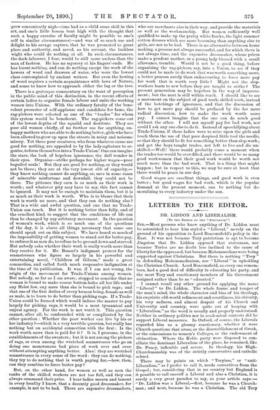LETTERS TO THE EDITOR.
DR. LIDDON AND LIBERALISM.
[To THE EDITOR OF THE " SPECTAFORn Sin,—Most persons who knew anything of Dr. Liddon must be astonished to hear him styled a "Liberal," merely on the ground of his opposition to Lord Beaconsfield's policy in the East. It was not because Tory patriotism is apt to become Jingoism that Dr. Liddon opposed that statesman, nor because Tories are no doubt less inclined to the cause of libertyfor the oppressed, but because Mahommedans were being supported against Christians. But there is nothing " Tory " in defending Mahommedanism, nor " Liberal " in upholding the Christian Church. Lord Beaconsfield, as every one remem- bers, had a good deal of difficulty in educating his party, and the most Tory and reactionary members of his Government resigned rather than be so "educated."
I cannot recall any other ground for applying the name "Liberal" to Dr. Liddon. The whole frame and temper of the man's mind, the whole character and bias of his theology, his exquisite old-world refinement and courtliness, his chivalry, his very sadness, and almost despair of his Church and University and country, were quite out of keeping with "Liberalism," as the word is usually and properly understood. Neither in ordinary politics nor in academical contests did he support Liberal measures. In Oxford, of course, the Liberals regarded him as a gloomy reactionary, whether it were Church questions that arose, or the disestablishment of Greek, or the concessions to women's Colleges, or the endowment of vivisection. Where the Beble party were disposed to con- ciliate the dominant Liberalism of the place, he remained, like Dr. Pusey, inflexible and severe. In theology, his High- Churchmanship was of the strictly conservative and catholic school.
There may be points on which "Toryism," or " anti- Liberalism," as I prefer to call it, needs correctives from the Gospel ; but, considering that in no country but England is it possible to call oneself a Liberal and also a Christian, it is surely a very great paradox to say, as your article says :— "Dr. Liddon was a Liberal,—first, because he was a Church- man; and next, because he was a Christian. The old Tory
theory of churchmanship was perfectly hateful to him. He cared absolutely nothing for the material splendours that belong to a wealthy and powerful Establishment." This strikes me as exceedingly unphilosophical, and hardly to attempt justice to opinions which the Spectator dislikes. That justice, indeed, is meted out to other opponents; but the Spectator never seems to care to look for anything in Toryism but contemptible principles. Where is the justice or the intelligence in constantly describing Toryism, especially old Toryism, as a mere regard for class privileges and worldly splendours ? The Whig or Hartingtonian conception of a Church subordinating herself to the House of Commons for the sake of endowments, is the exact opposite of the High Tory idea. It was because the Nonjurors were Mei Tories that they gave up preferment rather than take the oaths to William and Mary. A mere Conservative may be in some danger of Erastianism ; but the High Tory, though he esteems very highly the principle of the union of Government and Christianity, places the divine authority of the Church before even that. Newman regarded Liberalism as Antichrist. Keble, Isaac Williams, and Dr. Pusey were Tories and anti- Erastians ; and the name "old-fashioned Tory" has been more than once given to Dr. Liddon.—I am, Sir, &c., AN OXFORD FELLOW.
[Nevertheless, the most palpable distinction between old and new Conservatism is that the latter does not defend privilege.—En. Spectator.]



































 Previous page
Previous page